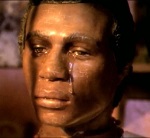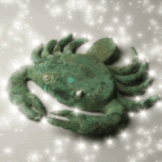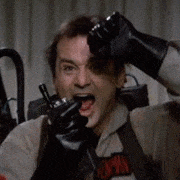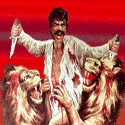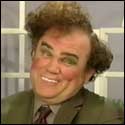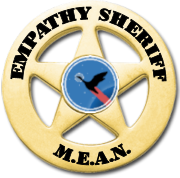|
It also relieved me to learn that Fahrenheit 451 is 46,118 words and The Great Gatsby is only 47,094 words. If critically acclaimed works of fiction can be around that length I think that's manageable for me.
|
|
|
|

|
| # ? May 11, 2024 10:22 |
|
Liam Emsa posted:I have a problem of being too concise, and I think it's causing my novel to be shorter than it should be. I feel like I've written a tremendous amount of plot, and I think I'm reaching the latter third of my story, but I'm only at 30,000 words. I don't think so. You see the world in your head, and when you're first plotting out a book, you might not convey that to the reader. Go back through and look for scenes that aren't described at all or are telly. Look for places to describe characters and scenery and all that stuff. You'll know where it's needed, and then it won't be useless. 
|
|
|
|
In your head the plot is "Go from point A to B to C to D" and you don't think to add dumb little details in between. An example I use is the short scene in Star Wars where Han/Luke escort Chewie to the prison block and you have this random moment of the cute little robot meeping, getting roared at, and scarpering off. I'd never have thought of that because I'm preoccupied with getting to point E, but people remember that moment. People like moments.
|
|
|
|
General Battuta posted:The villain had to pay a price, suffer an injury, or sacrifice a resource they didn't want to in order to escape without the hero's help. Scenes should be consequential. Baby Babbeh posted:If they refused the offer of information for help, then that implies that they realize they won't be completely hosed without the hero's assistance, no matter what the hero thought. So having them succeed at great cost actually makes dramatic sense: they've made a sacrifice they didn't want to make which gives them a reason to hate the protagonist, and at the same time they've revealed themselves to be more powerful than the hero assumed, which gives him a reason to be wary of them. Thanks, guys, I'm very grateful for your advice. It's made me think, and it's even helped me to come up with some new ideas. I think a problem I have is that I become too attached to particular ideas and struggle to let go of them even if they no longer fit in.
|
|
|
|
Liam Emsa posted:I have a problem of being too concise, and I think it's causing my novel to be shorter than it should be. I feel like I've written a tremendous amount of plot, and I think I'm reaching the latter third of my story, but I'm only at 30,000 words. The problem there can be that if you're being fancy about simple things then the reader will notice this. You don't need to describe the way the sunlight falls at that time of day in the station, moreso if it's just a transitional scene. It seems to me more that you're looking for your style, or more appropriately a style that's applicable to the story you're telling. There's nothing wrong with being concise. If you want a lesson in how great concise writing can be look at anything by Dashell Hammet. You might find that in your editing/re-writing process that you start to rework sentences naturally, or that new scenes etc will come up and suddenly you'll be looking at 50,000 words. Some writers will skip "He got the train to Baltimore" entirely and just announce the characters arrival there instead. Just finish it first, and then you can get that red pen out and go to town on what you think does and doesn't work.
|
|
|
|
Liam Emsa posted:It also relieved me to learn that Fahrenheit 451 is 46,118 words and The Great Gatsby is only 47,094 words. Yeah no offense but you're not Ray Bradbury or Fitzgerald. If you're writing for yourself or self-publishing that's one thing, but if you're trying to get your novel published by a publisher then you stand a much better shot if your word count falls within the usual guidelines. Depending on genre, it's usually 70k-120k. As for the lack of description, as others have said, reread important scenes and decide which feel fleshed out and which feel "flat." Consider things you could describe which would enhance the scene. Writers focus on the visual but often forget smells, sound, and touch. If your protagonist solves a problem easily, make it harder for him or her. You want as many obstacles for your protag and as many obstacles as possible. Now, this doesn't mean drinking from a water fountain has to be an existentialist struggle, but you'll hopefully find a balance as you go.
|
|
|
|
Bug Bill Murray posted:Yeah no offense but you're not Ray Bradbury or Fitzgerald. If you're writing for yourself or self-publishing that's one thing, but if you're trying to get your novel published by a publisher then you stand a much better shot if your word count falls within the usual guidelines. Depending on genre, it's usually 70k-120k. I'll need to dig it up if I can but Stephen King writes about it in 'On Writing'. It's the difference between saying someone walked up to a house and describing the house. How did it look, how did it feel, was it falling apart, did the floorboards creek etc. One line just states a thing happening, the other sets a mood.
|
|
|
|
Be careful about description for descriptions sake, though. Details matter, but only telling details matter. If it doesn't tell me something about the characters, how they're perceiving the scene or how I as the reader should be perceiving the scene, it shouldn't be in there.
|
|
|
|
Bug Bill Murray posted:Yeah no offense but you're not Ray Bradbury or Fitzgerald. If you're writing for yourself or self-publishing that's one thing, but if you're trying to get your novel published by a publisher then you stand a much better shot if your word count falls within the usual guidelines. Depending on genre, it's usually 70k-120k. I'm going to hijack this for my own question. This is a question for anyone who has advice on how to work with industry mandated word counts. I've written a YA novel. I've revised and edited it, though it isn't ready for a beta reader yet. It's about a teenage girl who starts out weak, gets superpowers, and ends up a BAMF. I feel like I have enough ideas and twists to make the tropes interesting. My problem is that it's currently 140k words. I don't know if I should split it into two books, cut out a lot, or aim for self publishing. -Split into two books - The first book would end with her getting superpowers. I'm not sure if a book is really all that good if the cool part - superpowers - isn't introduced until the climax. I've tried restructuring so she learns earlier but I can't get it to flow and don't know if it makes the story better. I'm willing to work on it. -Cut out a lot - The first half has had all the fluff cut out and is still ~65k. I would have to cut out characters or plot. The back half is in flux since I can't decide what to do. I feel like this option is "write a different book." -Self-publish - Let it be 140k as long as it has the right balance of elements without the fluff. But then I would have to do the marketing. And paying for editing would be expensive. Would you like to hear more rambling? I have a good idea/outline for a prequel (actually, I have ideas and outlines for two prequels, a sequel, and one short story, plus other ideas for short stories within the universe). So I could let my current book stand at 140k, write a shorter prequel, get that published, and then once I'm established, I can get my long piece published. I will probably write that prequel no matter what. And I know hardly anyone gets published by traditional publishers and I've heard that publishers currently shy away from books that have to be in a series unless you're an established author - but I think this story stands alone and the prequel I'm thinking of could stand alone too. I've read that agents will be less likely to look at your book if it doesn't have the right word count. Writing has been terrific all on its own but I'm serious about becoming good enough to make money. Not necessarily a lot of money.
|
|
|
|
Why didn't you start out at the point where she gets the superpowers?
|
|
|
|
Man, I wish I could write that much.
|
|
|
|
She has to get pregnant and be betrayed first. I also want to show who she is and how she responds to things before she gets powers - like the villain almost kills her and her baby. And the villain wants to kidnap her before she gets powers to experiment on her. I mean, I can see how getting powers is an inciting incident, and that's why I kind of had the idea of splitting what I have into two books. If I look at what I have right now, you're basically describing my second book if I split it into two. I could completely restructure things so that the two halves overlap but it looks like a completely different book. I'll have to think about that. I've got a caffeine rush right now and am heading to the gym.
|
|
|
|
Yeah, I'm not sure you could really get it published in that format. No offense, but I just don't see anyone biting on a book that would be marketed as being about superpowers where nobody gets superpowers until the 70,000 word mark. As an alternate idea, have you considered a kind of en median res structure where we have scenes of the main character being a badass intercut with scenes explaining how they got there? That puts some superhero stuff in the beginning and still lets you do your tedious build up to it. Granted it's not as straightforward to write as you have to really think about the interplay between the two narratives, but it's probably a more interesting way to write it.
|
|
|
|
No, this is something I need to hear. I have been trying to figure how superpowers can be my special midpoint twist and also the point of the book. I was trying to add conflict by having people hide secrets from the protagonist. I think I have been trying to resolve problem of introducing superpowers late by downplaying superpowers and making it more of a coming of age story. That's not as exciting though.
|
|
|
|
I'll be more direct as others have already provided thoughtful responses: dude look up "in media res." Also, a protagonist getting superpowers way into the story just feels like a personal fantasy to feel badass rather than actual character development. One thing to consider for any story is "what does it promise?" A story that starts as a heist story should follow through on the expectation/promise of being a heist story. It would be a betrayal of that promise to turn it into a romance story. Further: it would be a betrayal to turn a drag race story into a courtroom drama halfway through. The Sean fucked around with this message at 03:21 on Jan 21, 2015 |
|
|
|
I strongly agree, especially for YA, that the superpowers need to show up very close to the start. You need to at least be hinting at the powers developing, things happening that she doesn't understand, etc,
|
|
|
|
I am convinced that I need to bring superpowers into the story sooner. In media res - I personally don't like reading stories that use this structure. But I could look into it. I think that I can have the plot and structure basically the same but introduce superpowers earlier. I think this would help telescope my first act but that's only 17k. So even with this big structural change that I will do, I think I will still have a word count problem. I am at the gym so I don't have my laptop to see if I can automatically cut several 3k scenes. And I do want to say in my defense that the opening scene is the villain wanting to take her away to experiment on her so I've got some big hints early on that something is happening. I'm thinking I can keep that scene and then the next scene we see she's got powers. Tesla Insanely Coil fucked around with this message at 03:51 on Jan 21, 2015 |
|
|
|
Tesla, agreeing with the others that if the main hook of your novel is superpowers, then they have to come in early. If not in the first chapter, then in the first 50 pages for sure. I don't read a lot of YA but I imagine that you have even less time to get to the point than in adult fiction. Young readers want stakes and action early. If you pitch an agent a book about a girl with superpowers they're going to be wondering where the hell they are after the first few chapters. If they even read that far. NOW HAVING SAID THAT I think you have a few options. You could take everything you've written so far and treat it as backstory for your character, and start anew at the inciting incident (where she gets superpowers). Obviously, this sucks, especially after all the time you've put in. Another idea, if you like your story as it stands now, is to lose the superpowers completely, or change them into something less relevant to the overall structure. There are no shortage of YA protagonists with hidden powers, after all. I haven't read your book so I don't know if this is a feasible option, but if your story is compelling enough up until the ending it might be something to consider. Someone suggested a media res structure with flashbacks which is an interesting idea also, but I think it would be very hard to pull off well. If you do this you definitely want to start off with the protag kicking rear end for a few chapters before going into the past. Either way, you have a lot of material to work with so I'm sure you'll figure something out. But yeah, even if you self-publish you should trim it down from 140k. 2 books of 70k is twice the amount of books your readers can buy, if they like your stuff.
|
|
|
|
Thanks a bunch to everybody for the advice. I feel like I had a break through and that's always nice. In the past when I've tried to change when she learns about or gets superpowers, I've always kept it within the second act. Megazver's words about starting with superpowers is seriously nothing I had considered - you know, bringing it into the first act. I've edited my first two thousand words, which are my first chapter, and this evening I've started a new chapter two where she realizes that she has superpowers. I think it's going to work out nicely. I tweaked my pseudo-biology.
|
|
|
|
When you're writing pulp I think it helps to have a back story that you reference but don't show. In fact back story is usually more interesting when it's only alluded to. If you think of Lord of the Rings or Game of Thrones or even the original Star Wars trilogy those series all gain a sense of weight and history by virtue of having back stories that are referred to but never shown (also note that in the case of the Silmarillion or the Star Wars prequels, attempts to show the back story turned out to be incredibly boring). I would also suggest that you should probably take into account that your story, at least as described in this thread, sounds like it's covering well trod ground. "Protagonist has powers they are not yet aware of, villain strives to capture them before those powers awaken" is one of the most common set ups imaginable (especially if you also have a good guy character who shows up to tell the protagonist that they have great potential or are the chosen one or that there is a prophecy they must fulfil). I bring this up because if you're doing a really by-the-numbers fantasy story about a character with immense latent powers being pursued by a villain who wants to exploit those powers for their own ends then you might not want to belabour the reader with a lot of build up for a tale they've already heard told a thousand times. Instead ask yourself what parts of this narrative are going to be different or more interesting than what the reader is used to.
|
|
|
|
How long does it generally take to receive a response to a query letter? I know this is a broad question with no one answer but I've queried about twenty agents this month and only one responded thus far with a form rejection. It's so suspenseful, I feel like I check my email about ten times a day now. Anyone with experience have a general ballpark figure? When should I query another batch?
Captain Mog fucked around with this message at 03:07 on Jan 22, 2015 |
|
|
|
Literally any time. I've gotten responses in hours, days, and weeks. I've been waiting three months to hear back from one agent who requested my full manuscript; I just sent him a nudge yesterday.
|
|
|
|
Captain Mog posted:How long does it generally take to receive a response to a query letter? I know this is a broad question with no one answer but I've queried about twenty agents this month and only one responded thus far with a form rejection. It's so suspenseful, I feel like I check my email about ten times a day now. Anyone with experience have a general ballpark figure? When should I query another batch? A couple months on median. Try to put it out of your mind. e: in other news, second books are impossible, and I'm trying to put it out of my mind: maybe I can pull some kind of zen poo poo and still make the deadline
|
|
|
|
Captain Mog posted:How long does it generally take to receive a response to a query letter? I know this is a broad question with no one answer but I've queried about twenty agents this month and only one responded thus far with a form rejection. It's so suspenseful, I feel like I check my email about ten times a day now. Anyone with experience have a general ballpark figure? When should I query another batch? Twenty in one go is kind of a lot. I'd wait a couple weeks and if you don't get any bites maybe tweak the query letter a little bit.
|
|
|
|
Tesla Insanely Coil posted:No, this is something I need to hear. I have been trying to figure how superpowers can be my special midpoint twist and also the point of the book. I was trying to add conflict by having people hide secrets from the protagonist. I think I have been trying to resolve problem of introducing superpowers late by downplaying superpowers and making it more of a coming of age story. That's not as exciting though. For example, does the Lord of the Rings (a famously bloated series) include 300 pages of Frodo and Sam before the adventure even starts, starting from a loose acquaintanceship and eventually become an almost brotherly connection? No. Is it obvious from the way they speak to each other and act around each other? Yes. It's Show Don't Tell in a pretty undistilled form. Also, starting with her hanging out then gaining powers in the first 30 pages is not In Media Res. That would be starting with her using her powers to fight some guy. Having the actual plot kick off straight away (instead of dawdling around with backstory for 70,000 words) is just a regular story. It is not the exception, it is the rule.
|
|
|
|
Yes, SurreptitiousMuffin I do agree. In my last post I said that I was writing a chapter two where I introduced the superpowers. This is a chronological chapter two, not an in media res situation, which I didn't make clear. Chapter 1, Sunday: Ruth's past catches up with her (2000 words) Chapter 2, Monday: Demonstration of Ruth's powers To expand on your Lord of the Rings analogy, my last draft would be like if I were Tolkien and gave Frodo the ring for the first time in Rivendell. I am now editing so that Frodo is getting the ring while still at home, as it should be. And yes, it's going to be a big edit!
|
|
|
|
I'll admit Save the Cat is a bit cliche (and the creator's greatest credit is Stop! Or My Mother Will Shoot!) but it still works pretty well as a loose outline of when stuff should happen in a normal book or screenplay. Link Save a copy for yourself, punch your wordcount in, and it'll give you a loose framework that you can follow/break at your leisure. YA tends not to push the boundaries much, so playing by the rules is much more likely to get you published. SurreptitiousMuffin fucked around with this message at 06:40 on Jan 23, 2015 |
|
|
|
SurreptitiousMuffin posted:I'll admit Save the Cat is a bit cliche (and the creator's greatest credit is Stop! Or My Mother Will Shoot!) but it still works pretty well as a loose outline of when stuff should happen in a normal book or screenplay. This document has now been unlocked so anyone with the link can view it. The main thing I like about the Save the Cat beat sheet is that it helps me fill and pace the second act. That is -- it jogs my mind to develop the second act, not it gives a magic formula and I just stick poo poo in there because it says to. Dr. Kloctopussy fucked around with this message at 07:06 on Jan 23, 2015 |
|
|
|
Dr. Kloctopussy posted:*very long and interesting post about world-building disease* As someone who is toying with the idea of writing science-fiction based on the numerous "world-building" ideas I've had over the years (getting tired of writing academic papers) I found your post to be quite interesting. However, from the point of view of someone who reads quite a bit of the genre, I'm not entirely sure that I agree with your main point. I think its really easy to overdo it on the world-building, to the point where the reader feels like the author is torturing them with details that they dont care about. Specific technological details can also make the book feel out of date if the author isn't ambitious enough. Therefore I feel like its best to keep world-building to the minimum necessary for the story to make sense, since the story is what most readers are really there for. On the other hand, if you have a really cool idea about how a world can work but without a really compelling story, its probably better to write it as a short story rather than a full novel. That way, readers can get the "wow factor" of your idea, without it being spoiled by a drawn-out story. Does any of that make sense? Mr.48 fucked around with this message at 16:17 on Jan 23, 2015 |
|
|
|
SurreptitiousMuffin posted:I'll admit Save the Cat is a bit cliche (and the creator's greatest credit is Stop! Or My Mother Will Shoot!) but it still works pretty well as a loose outline of when stuff should happen in a normal book or screenplay. This is amazing, thank you. It'll definitely help my outlining.
|
|
|
|
Save the Cat noooooooooooooooooo 
|
|
|
|
I think the other thing to bear in mind about in media res openings is that they'll probably help a lot with self-publishing. Potential readers will be able to download a free sample of the first ~10% of your book, so you want to make sure it really hooks them. Starting in the middle of the action is like a promise about how good the book is going to get. Slow build stories are probably best left until you have a guaranteed audience who will stick with the story beyond the first few pages.
|
|
|
|
It was either that spreadsheet or a composite of several and I entered the wordcount for Harry Potter &t Philosophers Stone and nearly threw the book at the wall when the spreadsheet accurately predicted story beats down to the page number. It was only one or two near the beginning though so that's just a coincidence, but it's useful for general flow.
|
|
|
|
Is it really that scandalous that there's a standard beat progression that tends to work when you're telling a fairly simple story? I know a lot of people hate Save the Cat but there's also a lot of people who deviate from it significantly and write lovely unreadable crap that doesn't respect the reader's time and effort.
|
|
|
|
I like this one. It's the only book of the sort that actually made sense to me, even if it's about scriptwriting and not novel writing. http://www.amazon.com/gp/product/00...3VFOF5LXL44S5OF
|
|
|
|
ravenkult posted:I like this one. It's the only book of the sort that actually made sense to me, even if it's about scriptwriting and not novel writing. http://www.amazon.com/gp/product/00...3VFOF5LXL44S5OF Scriptwriting books always teach me way more about structure and narrative than prose writing books.
|
|
|
|
ravenkult posted:I like this one. It's the only book of the sort that actually made sense to me, even if it's about scriptwriting and not novel writing. http://www.amazon.com/gp/product/00...3VFOF5LXL44S5OF I really tried to read that, but I got tired of hacking my way through twice as many words as there needed to be (at least!). Not to mention all the masturbating about how great and noble writing is. I'm reading a loving writing book, you don't have to convince me that writing is a worthwhile pursuit.
|
|
|
|
General Battuta posted:Save the Cat noooooooooooooooooo
|
|
|
|
General Battuta posted:Save the Cat noooooooooooooooooo Not all of us can be stuck on writing our second published book  Anyway, you obviously can't just throw poo poo at a wall in the shape of an outline and write a good novel, but a simple guide to basic story structure isn't going to hurt anyone. Of course, they SHOULD learn it from reading a lot. (Read more, y'all) Mr.48 posted:As someone who is toying with the idea of writing science-fiction based on the numerous "world-building" ideas I've had over the years (getting tired of writing academic papers) I found your post to be quite interesting. However, from the point of view of someone who reads quite a bit of the genre, I'm not entirely sure that I agree with your main point. I think its really easy to overdo it on the world-building, to the point where the reader feels like the author is torturing them with details that they dont care about. Specific technological details can also make the book feel out of date if the author isn't ambitious enough. Therefore I feel like its best to keep world-building to the minimum necessary for the story to make sense, since the story is what most readers are really there for. On the other hand, if you have a really cool idea about how a world can work but without a really compelling story, its probably better to write it as a short story rather than a full novel. That way, readers can get the "wow factor" of your idea, without it being spoiled by a drawn-out story. My point was DO as much as you want, not write as much as you want into a story and expect people to enjoy reading it. Dr. Kloctopussy posted:My take on world building: Any differences between "our world" and the "other world" need to fold back into the story. They need to have a narrative point. "World-builder's disease" typically refers to people who fill whole binders full of backstory before they start writing any part of the book. How much of that world-building background should make it into your story? Why, the amount necessary of course. Dr. Kloctopussy fucked around with this message at 06:45 on Jan 24, 2015 |
|
|
|

|
| # ? May 11, 2024 10:22 |
|
Remora posted:I really tried to read that, but I got tired of hacking my way through twice as many words as there needed to be (at least!). Not to mention all the masturbating about how great and noble writing is. I'm reading a loving writing book, you don't have to convince me that writing is a worthwhile pursuit. This is also why I speed read large chunks of On Writing books.
|
|
|


